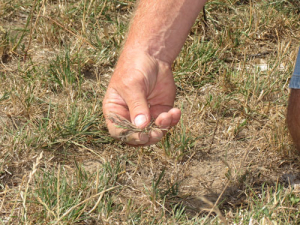Most major banks are offering some assistance for drought stricken farmers.
ANZ Bank was first off the blocks, announcing an assistance package for Northland farmers after the drought declaration.
“This is the fifth drought in the last eight years for Northland, and while the recent boost in dairy payout has assisted cashflow, our priority is to make sure farmers can manage financially through this extreme weather event,” says Penny Ford, general manager Auckland & Northland, commercial and agri.
The ANZ Assistance Package invites affected customers to talk to their banker to:
Apply for short-term funding to assist them to cope financially with unexpected costs arising from extreme weather
Suspend or reduce loan principal repayments
Waive notice period requirements and avoid interest rate recovery costs associated with accessing funds on term deposit ahead of maturity date.
Waive fees associated with restructuring business loans.
Waive fees for term finance and investments which have the potential to improve performance in future.
ANZ customers affected by the Northland drought are encouraged to contact their relationship manager. The package took effect on February 4.
ASB’s Steve Jurkovich, executive general manager business banking, says ASB is monitoring the effect of dry conditions on its farming customers in Northland.
“Each farming customer will be experiencing different impacts from the dry conditions based on their unique farming business,” he says.
“Our rural managers are contacting customers to discuss ways ASB can assist, including interest only loan terms and additional working capital.
“We encourage customers to talk with their rural manager if they have any concern about their financial arrangements or just need an understanding [person] to talk with.”
Westpac says it is reviewing Northland farmer customers to ascertain what their individual needs may be.
“Our agri managers have the capability to provide immediate financial assistance for those in need, with options including repayment holidays for lending, and business and personal financial assistance,” a spokersperson says.
BNZ’s head of agribusiness John Jannsen says when lending in volatile climate areas, e.g. Northland, banks need to take a pragmatic and flexible approach to working with farmers to minimise unnecessary financial pressure when these events happen.
“The majority of our clients in the area have businesses which reflect the volatile nature of the region.”
Rabobank’s northern North Island regional manager, Bruce Weir, says the bank is working with its affected Northland customers “to mitigate the impacts of the drought and ensure farmers are well positioned to rebuild production and their financial position when seasonal conditions improve”.
“Rabobank takes a long-term view and understands that climate extremes, like the current drought conditions, are part of the business of farming,” he says.
Rabobank will work case-by-case to assist farmers facing problems resulting from these events.
“Our rural loans are specifically designed for farmers and offer financial flexibility to help manage through times of difficulty.”
Weir says Rabobank employees have been contacting clients in drought-affected areas to offer the bank’s assistance.
Affected clients who have concerns and who have not yet spoken to the bank are urged to contact their local rural manager or branch.


















